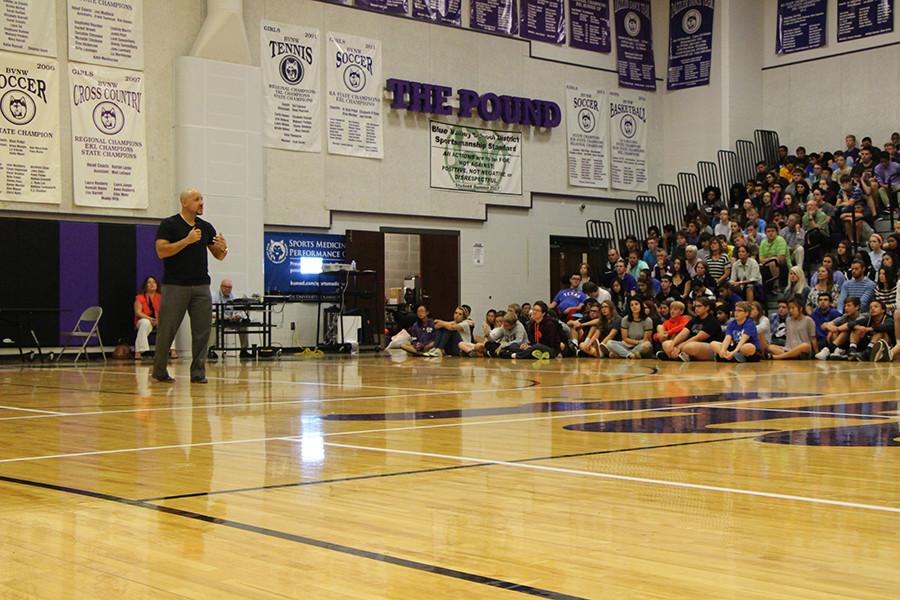Kevin Hines helps students help each other
Mental wellness advocate Kevin Hines spoke at an assembly Tuesday to tell students about his experience with suicide and to educate students on living mentally healthy.
August 25, 2015
Near the end of his speech Tuesday morning, mental wellness advocate, international speaker and author of “Cracked Not Broken,” Kevin Hines touched on how students can help each other stay mentally healthy as a step in suicide prevention.
Hines’ advice for helping friends and peers who may be suffering begins with awareness. He said that if there is someone during the day in school “who is either a friend or someone you don’t know very well but they’re in emotional pain,” it is everyone’s duty to be cognizant and to reach out to simply ask if he or she needs help.
“First of all, if you can have the inclination that someone is potentially suicidal, you have to go to that person, you have to sit down with them and ask them ‘Are you having thoughts of taking your life?’” Hines said. “You have to ask that question … If they’ve thought about it, you’ve just opened a world of honesty to them.”
One thing he said he did not have time for, however, is a characteristic of most of his high school presentations – the goal at the end is to create a time for the audience to share and communicate with each other any areas of pain that may have stemmed from mistreatment among them at school.
Hines started his speech by talking about his own experience with mental health: that of being diagnosed with bipolar disorder at 17 years old and attempting suicide by jumping off San Francisco’s Golden Gate Bridge approximately two years later.
Hines said there is sometimes a lack of empathy for those who suffer from mental illness by those who do not fully understand. In this case, he said it is necessary for those who do empathize to make their voices louder to help wash away the negative stigma surrounding mental health.
After watching the presentation, junior Kaylan Moore said she felt that the power of Hines’ message was received well by the audience. She also said she personally recognized the need to destigmatize mental illness.
“I plan to not judge anyone’s problems,” Moore said, “because everyone has their problems. It doesn’t matter who they are or how big or small they are, they’re problems and everybody needs help.”
Hines said a helpful tactic when dealing with people who are either mentally suffering or suicidal is to keep them future-focused in order to keep their minds on better things and help them know they are not alone.
Senior Lauren Christie said the topic of maintaining a good mental health is relevant among high school student bodies, BVNW specifically.
“Especially with schools like [BVNW] that are pushing the students so hard to do well to do and to be to their fullest potential, it can definitely seem we are overloaded,” Christie said. “I think it’s definitely relevant at this school.”
While Hines said he does not necessarily categorize mental health as a problem in high school, he thinks it is an opportunity for open communication among teachers, parents, staff and students to talk about mental health and create change.
“The experience I had today was very special because of the people that came up to me afterwards and told their stories and it was raw, it was honest; a couple of them were crying and we got them to counselors right away,” Hines said. “Maybe they hadn’t done that in the past, maybe that was the catalyst to get them to talk about what they’re going through and that was really a wonderful thing to see someone make a decision to get help now.”
There will be a similar, district-wide presentation Tuesday at 7 p.m. at the Hilltop Learning Center for parents and students to learn about recognizing the signs of mental illness.
If you think you or someone you know may be suicidal, call the National Suicide Lifeline at 1-800-273-8255.










